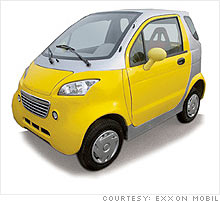Exxon's electric car trip to Baltimore
Oil giant forms a partnership with car maker Electrovaya and the Maryland Science Center to provide the Maya 300 to residents and visitors of Charm City.
 |
| Maya 300 |
Find Your Next Car
NEW YORK (CNNMoney.com) -- Despite Exxon Mobil Corp.'s well-publicized stance in support of fossil fuels, the oil giant said on Tuesday that it is sponsoring a program to bring a zero-emission electric vehicle to Baltimore.
The car, called the Maya 300, is a partnership between the oil company and electric-vehicle maker Electrovaya. Exxon (XOM, Fortune 500) is providing parts for the Electrovaya's lithium-ion battery.
The Maya 300 is slated to be available for sale in 2011, but visitors to the Maryland Science Center can test drive it for free, beginning on Tuesday, on a track inside the building.
The test program ends August 1, when a car-sharing program will become available for a membership fee. Through the car-sharing program, drivers can rent the Maya 300 vehicles for $14.50 an hour, for a minimum of 2 hours.
A standard rental program will also be available "in the coming months," a press release said. Further details were unavailable.
The environmental conundrum. Exxon President and Chief Executive Rex Tillerson has been resistant to pegging his company's future on alternative energy.
In August 2008, Tillerson told ABC News, "I cannot say we're going to opt for an alternative elsewhere at the expense of oil and natural gas, because oil and natural gas are going to take us to [the] future."
That same year the Rockefeller family, influential Exxon shareholders, made an attempt to separate Tillerson's CEO and chairman positions, saying they wanted Exxon to invest more in alternative energy.
Later, four large British investors joined the family's effort, which ultimately failed.
Because of Tillerson's stance, this foray into the electric vehicle market comes as a surprise to some even though Exxon has been researching alternative energy for years.
"My initial reaction is that this is PR more than anything else," said Paul Weiss, analyst at Argus Research Company.
But Robert Kessler, an analyst at Simmons & Company International, disagreed that Exxon's move was a public-relations grab.
"I think there's a genuine interest to increase energy efficiency," Kessler said. "They're interested in all options, especially any investment that generates an attractive return."
Exxon is "one of the slower-moving, more conservative" energy companies in terms of investing in renewable energy, and that approach has paid off thus far, Kessler said.
"With the benefit of hindsight, we see that investing in [alternative energy] a year ago looks to have been early relative to the opportunities available today," he said. Exxon's caution has helped its bottom line, said Kessler.
Just a timely investment? The move could also be part of a larger motive to invest in Electrovaya or other small alternative-energy firms, as Exxon enjoys a strong balance sheet and a large amount of cash, Argus' Weiss said.
"Exxon is in a position to take on some risk," Weiss said. "If a company they invest in does well, it would be a great move for them to have equity in it."
Electrovaya said the Maya 300 will be zero-emission and low-speed, with a standard battery pack that can drive for up to 60 miles on a single charge, and will be available for about $25,000. Another version with an extended 120 mile-range battery will sell for about $35,000.
Tuesday's event will also feature the opening of an Exxon-sponsored energy efficiency exhibit at the Maryland Science Center. Exxon has invested more than $500,000 in the car-sharing program and exhibit. ![]()

